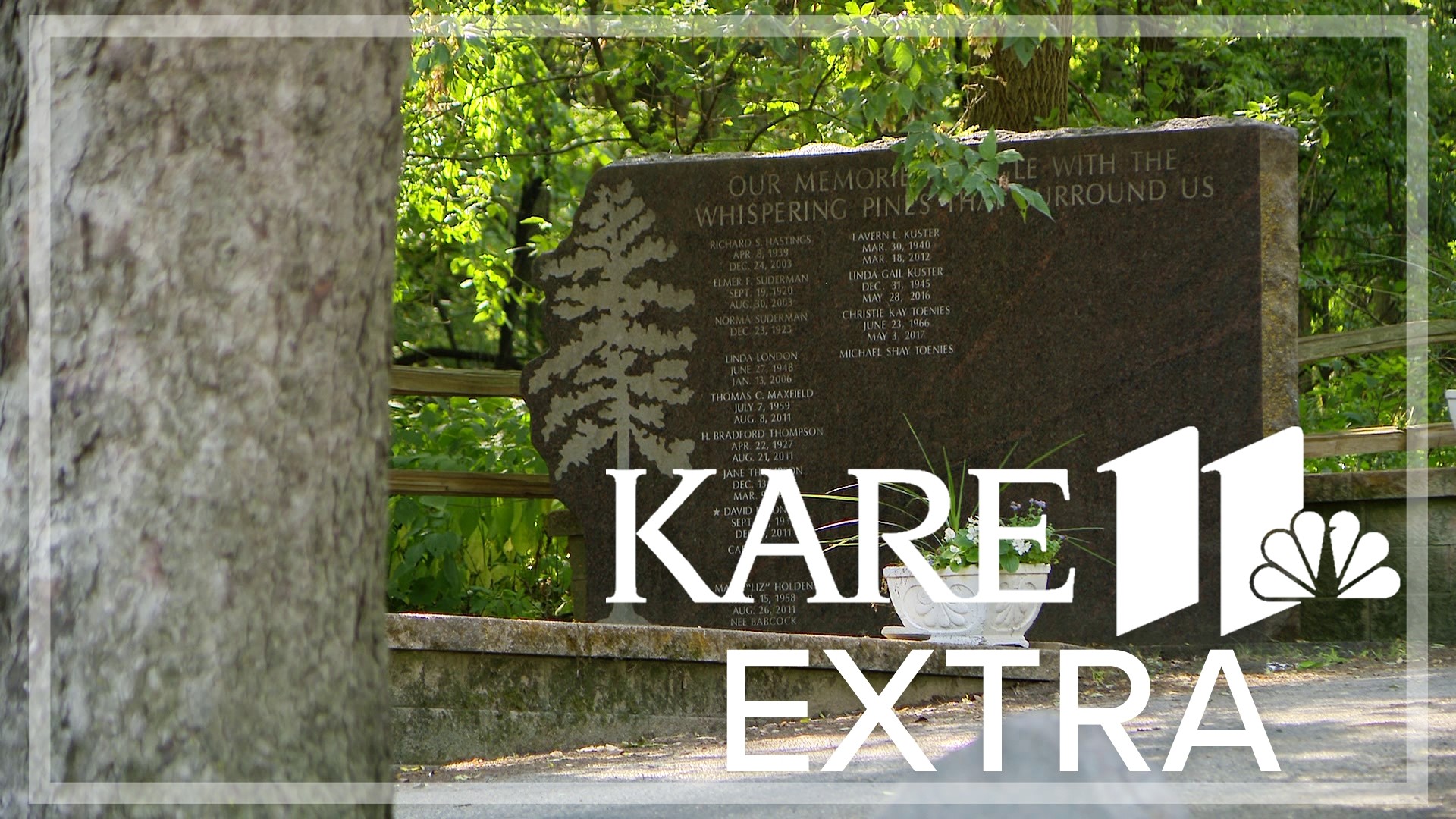SCANDIA, Minn. — When Kevin Ryall was faced with the sudden loss of his partner, Quinn Vanderbosch, in 2020, he felt lost about all the decisions that suddenly had to be made.
"You're like, 'What do I do now?'" Ryall said.
Vanderbosch never talked about how he'd want to be remembered, so Ryall and the Vanderbosch family opted for cremation to give some added time to process their grief and decide funeral arrangements.
In the process, he discovered Better Place Forests. It's Minnesota's first memorial forest, where trees stand in place of headstones, and ashes are spread around them instead of bodies buried below.
"I felt like this found us," Ryall said. "We're actually in front of Quinn's tree, and there is a marker down here as well. "It says, 'You are missed, you are remembered, you'll be in our hearts and forever loved.' A place to come was very, very important to me, but didn't want it to be in a cemetery."
That's a sentiment Shanna Wood has heard more and more in recent years.
"I think a lot of people choose cremation because it gives them more options," said Wood, a mortician and licensed funeral director at Mankato Mortuary.
Regardless of the reasons why, the trend toward cremation has increased dramatically in the U.S. in recent decades. According to the Cremation Association of North America, in the 1960's, just three percent of Americans were cremated after death. But the rate has grown every year since, and nearly reached 60 percent in 2021.
Locally, the growth is even greater.
Wood: "I think we can look back even 15 years and 30 percent of our services were cremations. Now, I think it's up to 70 percent."
Erdahl: "That seems like a lot."
Shanna: "Yeah, it definitely is. It's gone up 40% in 15 years."
To keep up with demand, Mankato mortuary doubled it's cremation capacity in 2018, while cutting back its casket selection room.
"This way we're able to have more space to meet with families," she said. "This actual selection room doesn't need to be quite as large."
The change has also shifted how many cemeteries operate.
"I think it's great," said Pat Johnson, who is general manager at Woodlawn Cemetery outside of St. Peter. "I don't understand the sense of hanging on to that body."
That may not be what you would expect to hear from someone leading a cemetery, but as a public entity operating on donations, Johnson says Woodlawn Cemetery has a responsibility to meet that growing demand for untraditional burial options.
"This is what we call our 'memory garden' and it's for cremains only," Johnson said.
Instead of buying an entire burial plot, customers can buy a small spot in the memory garden to spread or bury their ashes. They can then have their name added to the garden's large memorial stone.
"I get a lot of phone calls from mortuaries: 'Do you require a vault? Do you require an urn?'" she said. "We just don't need to. There's no reason to — other than somebody needs to make some money."
Speaking of that, saving on all of the normal burial costs is definitely a motivation for some.
"I mean, it's really about half the cost for a cremation memorial service than it is for a traditional casketed burial," Wood said.
"Money is one thing," Johnson said. "The other thing is the trend to go back to nature."
Though standard cremation is not as environmentally friendly as green burials — which often involve burying bodies without embalming inside either wood or cloth enclosures — Johnson says they remain rare because of several limitations.
Without embalming, funeral arrangements often need to happen quickly, and she says burial costs can sometimes be higher due to increased maintenance.
Options for more eco-friendly cremations have also been on the rise. Many mortuaries now offer flameless cremations, and some states have even approved human composting.
Johnson says the trend clearly seems to be toward a smaller footprint.
"Oh, I'll be cremated," Johnson said. "And there won't be any urn. I will be in just a paper bag or a wooden box that they dump the ashes in the ground."
Ryall chose to do that at Better Place Forests because it also comes with a commitment to conservation.
"Not only are we preserving this land, but they will plant 50 saplings in Quinn's honor, in a forest that needs it," Ryall said. "Now, looking back and having some time to reflect, I'm very confident that this is exactly what Quinn would want."
Watch more local news:
Watch the latest local news from the Twin Cities in our YouTube playlist:

